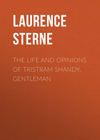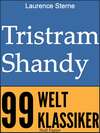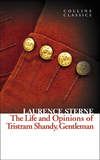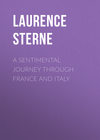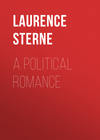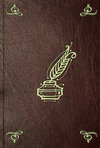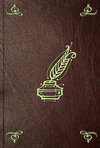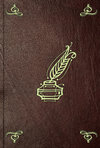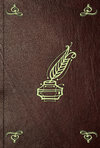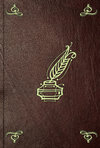Buch lesen: «The Life and Opinions of Tristram Shandy, Gentleman», Seite 18
Chapter 2.XXXV
No matter—as an appendage to seamstressy, the thread-paper might be of some consequence to my mother—of none to my father, as a mark in Slawkenbergius. Slawkenbergius in every page of him was a rich treasure of inexhaustible knowledge to my father—he could not open him amiss; and he would often say in closing the book, that if all the arts and sciences in the world, with the books which treated of them, were lost—should the wisdom and policies of governments, he would say, through disuse, ever happen to be forgot, and all that statesmen had wrote or caused to be written, upon the strong or the weak sides of courts and kingdoms, should they be forgot also—and Slawkenbergius only left—there would be enough in him in all conscience, he would say, to set the world a-going again. A treasure therefore was he indeed! an institute of all that was necessary to be known of noses, and every thing else—at matin, noon, and vespers was Hafen Slawkenbergius his recreation and delight: 'twas for ever in his hands—you would have sworn, Sir, it had been a canon's prayer-book—so worn, so glazed, so contrited and attrited was it with fingers and with thumbs in all its parts, from one end even unto the other.
I am not such a bigot to Slawkenbergius as my father;—there is a fund in him, no doubt: but in my opinion, the best, I don't say the most profitable, but the most amusing part of Hafen Slawkenbergius, is his tales—and, considering he was a German, many of them told not without fancy:—these take up his second book, containing nearly one half of his folio, and are comprehended in ten decads, each decad containing ten tales—Philosophy is not built upon tales; and therefore 'twas certainly wrong in Slawkenbergius to send them into the world by that name!—there are a few of them in his eighth, ninth, and tenth decads, which I own seem rather playful and sportive, than speculative—but in general they are to be looked upon by the learned as a detail of so many independent facts, all of them turning round somehow or other upon the main hinges of his subject, and added to his work as so many illustrations upon the doctrines of noses.
As we have leisure enough upon our hands—if you give me leave, madam, I'll tell you the ninth tale of his tenth decad.
Slawkenbergii Fabella (As Hafen Slawkenbergius de Nasis is extremely scarce, it may not be unacceptable to the learned reader to see the specimen of a few pages of his original; I will make no reflection upon it, but that his story-telling Latin is much more concise than his philosophic—and, I think, has more of Latinity in it.)
Vespera quadam frigidula, posteriori in parte mensis Augusti, peregrinus, mulo fusco colore incidens, mantica a tergo, paucis indusiis, binis calceis, braccisque sericis coccineis repleta, Argentoratum ingressus est.
Militi eum percontanti, quum portus intraret dixit, se apud Nasorum promontorium fuisse, Francofurtum proficisci, et Argentoratum, transitu ad fines Sarmatiae mensis intervallo, reversurum.
Miles peregrini in faciem suspexit—Di boni, nova forma nasi!
At multum mihi profuit, inquit peregrinus, carpum amento extrahens, e quo pependit acinaces: Loculo manum inseruit; et magna cum urbanitate, pilei parte anteriore tacta manu sinistra, ut extendit dextram, militi florinum dedit et processit.
Dolet mihi, ait miles, tympanistam nanum et valgum alloquens, virum adeo urbanum vaginam perdidisse: itinerari haud poterit nuda acinaci; neque vaginam toto Argentorato, habilem inveniet.—Nullam unquam habui, respondit peregrinus respiciens—seque comiter inclinans—hoc more gesto, nudam acinacem elevans, mulo lento progrediente, ut nasum tueri possim.
Non immerito, benigne peregrine, respondit miles.
Nihili aestimo, ait ille tympanista, e pergamena factitius est.
Prout christianus sum, inquit miles, nasus ille, ni sexties major fit, meo esset conformis.
Crepitare audivi ait tympanista.
Mehercule! sanguinem emisit, respondit miles.
Miseret me, inquit tympanista, qui non ambo tetigimus!
Eodem temporis puncto, quo haec res argumentata fuit inter militem et tympanistam, disceptabatur ibidem tubicine et uxore sua qui tunc accesserunt, et peregrino praetereunte, restiterunt.
Quantus nasus! aeque longus est, ait tubicina, ac tuba.
Et ex eodem metallo, ait tubicen, velut sternutamento audias.
Tantum abest, respondit illa, quod fistulam dulcedine vincit.
Aeneus est, ait tubicen.
Nequaquam, respondit uxor.
Rursum affirmo, ait tubicen, quod aeneus est.
Rem penitus explorabo; prius, enim digito tangam, ait uxor, quam dormivero,
Mulus peregrini gradu lento progressus est, ut unumquodque verbum controversiae, non tantum inter militem et tympanistam, verum etiam inter tubicinem et uxorum ejus, audiret.
Nequaquam, ait ille, in muli collum fraena demittens, et manibus ambabus in pectus positis, (mulo lente progrediente) nequaquam, ait ille respiciens, non necesse est ut res isthaec dilucidata foret. Minime gentium! meus nasus nunquam tangetur, dum spiritus hos reget artus—Ad quid agendum? air uxor burgomagistri.
Peregrinus illi non respondit. Votum faciebat tunc temporis sancto Nicolao; quo facto, sinum dextrum inserens, e qua negligenter pependit acinaces, lento gradu processit per plateam Argentorati latam quae ad diversorium templo ex adversum ducit.
Peregrinus mulo descendens stabulo includi, et manticam inferri jussit: qua aperta et coccineis sericis femoralibus extractis cum argento laciniato (Greek), his sese induit, statimque, acinaci in manu, ad forum deambulavit.
Quod ubi peregrinus esset ingressus, uxorem tubicinis obviam euntem aspicit; illico cursum flectit, metuens ne nasus suus exploraretur, atque ad diversorium regressus est—exuit se vestibus; braccas coccineas sericas manticae imposuit mulumque educi jussit.
Francofurtum proficiscor, ait ille, et Argentoratum quatuor abhinc hebdomadis revertar.
Bene curasti hoc jumentam? (ait) muli faciem manu demulcens—me, manticamque meam, plus sexcentis mille passibus portavit.
Longa via est! respondet hospes, nisi plurimum esset negoti.—Enimvero, ait peregrinus, a Nasorum promontorio redii, et nasum speciosissimum, egregiosissimumque quem unquam quisquam sortitus est, acquisivi?
Dum peregrinus hanc miram rationem de seipso reddit, hospes et uxor ejus, oculis intentis, peregrini nasum contemplantur—Per sanctos sanctasque omnes, ait hospitis uxor, nasis duodecim maximis in toto Argentorato major est!—estne, ait illa mariti in aurem insusurrans, nonne est nasus praegrandis?
Dolus inest, anime mi, ait hospes—nasus est falsus.
Verus est, respondit uxor—
Ex abiete factus est, ait ille, terebinthinum olet—
Carbunculus inest, ait uxor.
Mortuus est nasus, respondit hospes.
Vivus est ait illa,—et si ipsa vivam tangam.
Votum feci sancto Nicolao, ait peregrinus, nasum meum intactum fore usque ad—Quodnam tempus? illico respondit illa.
Minimo tangetur, inquit ille (manibus in pectus compositis) usque ad illam horam—Quam horam? ait illa—Nullam, respondit peregrinus, donec pervenio ad—Quem locum,—obsecro? ait illa—Peregrinus nil respondens mulo conscenso discessit.
Slawkenbergius's Tale
It was one cool refreshing evening, at the close of a very sultry day, in the latter end of the month of August, when a stranger, mounted upon a dark mule, with a small cloak-bag behind him, containing a few shirts, a pair of shoes, and a crimson-sattin pair of breeches, entered the town of Strasburg.
He told the centinel, who questioned him as he entered the gates, that he had been at the Promontory of Noses—was going on to Frankfort—and should be back again at Strasburg that day month, in his way to the borders of Crim Tartary.
The centinel looked up into the stranger's face—he never saw such a Nose in his life!
–I have made a very good venture of it, quoth the stranger—so slipping his wrist out of the loop of a black ribbon, to which a short scymetar was hung, he put his hand into his pocket, and with great courtesy touching the fore part of his cap with his left hand, as he extended his right—he put a florin into the centinel's hand, and passed on.
It grieves, me, said the centinel, speaking to a little dwarfish bandy-legg'd drummer, that so courteous a soul should have lost his scabbard—he cannot travel without one to his scymetar, and will not be able to get a scabbard to fit it in all Strasburg.—I never had one, replied the stranger, looking back to the centinel, and putting his hand up to his cap as he spoke—I carry it, continued he, thus—holding up his naked scymetar, his mule moving on slowly all the time—on purpose to defend my nose.
It is well worth it, gentle stranger, replied the centinel.
–'Tis not worth a single stiver, said the bandy-legg'd drummer—'tis a nose of parchment.
As I am a true catholic—except that it is six times as big—'tis a nose, said the centinel, like my own.
–I heard it crackle, said the drummer.
By dunder, said the centinel, I saw it bleed.
What a pity, cried the bandy-legg'd drummer, we did not both touch it!
At the very time that this dispute was maintaining by the centinel and the drummer—was the same point debating betwixt a trumpeter and a trumpeter's wife, who were just then coming up, and had stopped to see the stranger pass by.
Benedicity!—What a nose! 'tis as long, said the trumpeter's wife, as a trumpet.
And of the same metal said the trumpeter, as you hear by its sneezing.
'Tis as soft as a flute, said she.
–'Tis brass, said the trumpeter.
–'Tis a pudding's end, said his wife.
I tell thee again, said the trumpeter, 'tis a brazen nose,
I'll know the bottom of it, said the trumpeter's wife, for I will touch it with my finger before I sleep.
The stranger's mule moved on at so slow a rate, that he heard every word of the dispute, not only betwixt the centinel and the drummer, but betwixt the trumpeter and trumpeter's wife.
No! said he, dropping his reins upon his mule's neck, and laying both his hands upon his breast, the one over the other in a saint-like position (his mule going on easily all the time) No! said he, looking up—I am not such a debtor to the world—slandered and disappointed as I have been—as to give it that conviction—no! said he, my nose shall never be touched whilst Heaven gives me strength—To do what? said a burgomaster's wife.
The stranger took no notice of the burgomaster's wife—he was making a vow to Saint Nicolas; which done, having uncrossed his arms with the same solemnity with which he crossed them, he took up the reins of his bridle with his left-hand, and putting his right hand into his bosom, with the scymetar hanging loosely to the wrist of it, he rode on, as slowly as one foot of the mule could follow another, thro' the principal streets of Strasburg, till chance brought him to the great inn in the market-place over-against the church.
The moment the stranger alighted, he ordered his mule to be led into the stable, and his cloak-bag to be brought in; then opening, and taking out of it his crimson-sattin breeches, with a silver-fringed—(appendage to them, which I dare not translate)—he put his breeches, with his fringed cod-piece on, and forth-with, with his short scymetar in his hand, walked out to the grand parade.
The stranger had just taken three turns upon the parade, when he perceived the trumpeter's wife at the opposite side of it—so turning short, in pain lest his nose should be attempted, he instantly went back to his inn—undressed himself, packed up his crimson-sattin breeches, &c. in his cloak-bag, and called for his mule.
I am going forwards, said the stranger, for Frankfort—and shall be back at Strasburg this day month.
I hope, continued the stranger, stroking down the face of his mule with his left hand as he was going to mount it, that you have been kind to this faithful slave of mine—it has carried me and my cloak-bag, continued he, tapping the mule's back, above six hundred leagues.
–'Tis a long journey, Sir, replied the master of the inn—unless a man has great business.—Tut! tut! said the stranger, I have been at the promontory of Noses; and have got me one of the goodliest, thank Heaven, that ever fell to a single man's lot.
Whilst the stranger was giving this odd account of himself, the master of the inn and his wife kept both their eyes fixed full upon the stranger's nose—By saint Radagunda, said the inn-keeper's wife to herself, there is more of it than in any dozen of the largest noses put together in all Strasburg! is it not, said she, whispering her husband in his ear, is it not a noble nose?
'Tis an imposture, my dear, said the master of the inn—'tis a false nose.
'Tis a true nose, said his wife.
'Tis made of fir-tree, said he, I smell the turpentine.—
There's a pimple on it, said she.
'Tis a dead nose, replied the inn-keeper.
'Tis a live nose, and if I am alive myself, said the inn-keeper's, wife, I will touch it.
I have made a vow to saint Nicolas this day, said the stranger, that my nose shall not be touched till—Here the stranger suspending his voice, looked up.—Till when? said she hastily.
It never shall be touched, said he, clasping his hands and bringing them close to his breast, till that hour—What hour? cried the inn keeper's wife.—Never!—never! said the stranger, never till I am got—For Heaven's sake, into what place? said she—The stranger rode away without saying a word.
The stranger had not got half a league on his way towards Frankfort before all the city of Strasburg was in an uproar about his nose. The Compline bells were just ringing to call the Strasburgers to their devotions, and shut up the duties of the day in prayer:—no soul in all Strasburg heard 'em—the city was like a swarm of bees—men, women, and children, (the Compline bells tinkling all the time) flying here and there—in at one door, out at another—this way and that way—long ways and cross ways—up one street, down another street—in at this alley, out of that—did you see it? did you see it? did you see it? O! did you see it?—who saw it? who did see it? for mercy's sake, who saw it?
Alack o'day! I was at vespers!—I was washing, I was starching, I was scouring, I was quilting—God help me! I never saw it—I never touch'd it!—would I had been a centinel, a bandy-legg'd drummer, a trumpeter, a trumpeter's wife, was the general cry and lamentation in every street and corner of Strasburg.
Whilst all this confusion and disorder triumphed throughout the great city of Strasburg, was the courteous stranger going on as gently upon his mule in his way to Frankfort, as if he had no concern at all in the affair—talking all the way he rode in broken sentences, sometimes to his mule—sometimes to himself—sometimes to his Julia.
O Julia, my lovely Julia!—nay I cannot stop to let thee bite that thistle—that ever the suspected tongue of a rival should have robbed me of enjoyment when I was upon the point of tasting it.—
–Pugh!—'tis nothing but a thistle—never mind it—thou shalt have a better supper at night.
–Banish'd from my country—my friends—from thee.—
Poor devil, thou'rt sadly tired with thy journey!—come—get on a little faster—there's nothing in my cloak-bag but two shirts—a crimson-sattin pair of breeches, and a fringed—Dear Julia!
–But why to Frankfort?—is it that there is a hand unfelt, which secretly is conducting me through these meanders and unsuspected tracts?
–Stumbling! by saint Nicolas! every step—why at this rate we shall be all night in getting in—
–To happiness—or am I to be the sport of fortune and slander—destined to be driven forth unconvicted—unheard—untouch'd—if so, why did I not stay at Strasburg, where justice—but I had sworn! Come, thou shalt drink—to St. Nicolas—O Julia!—What dost thou prick up thy ears at?—'tis nothing but a man, &c.
The stranger rode on communing in this manner with his mule and Julia—till he arrived at his inn, where, as soon as he arrived, he alighted—saw his mule, as he had promised it, taken good care of—took off his cloak-bag, with his crimson-sattin breeches, &c. in it—called for an omelet to his supper, went to his bed about twelve o'clock, and in five minutes fell fast asleep.
It was about the same hour when the tumult in Strasburg being abated for that night,—the Strasburgers had all got quietly into their beds—but not like the stranger, for the rest either of their minds or bodies; queen Mab, like an elf as she was, had taken the stranger's nose, and without reduction of its bulk, had that night been at the pains of slitting and dividing it into as many noses of different cuts and fashions, as there were heads in Strasburg to hold them. The abbess of Quedlingberg, who with the four great dignitaries of her chapter, the prioress, the deaness, the sub-chantress, and senior canonness, had that week come to Strasburg to consult the university upon a case of conscience relating to their placket-holes—was ill all the night.
The courteous stranger's nose had got perched upon the top of the pineal gland of her brain, and made such rousing work in the fancies of the four great dignitaries of her chapter, they could not get a wink of sleep the whole night thro' for it—there was no keeping a limb still amongst them—in short, they got up like so many ghosts.
The penitentiaries of the third order of saint Francis—the nuns of mount Calvary—the Praemonstratenses—the Clunienses (Hafen Slawkenbergius means the Benedictine nuns of Cluny, founded in the year 940, by Odo, abbe de Cluny.)—the Carthusians, and all the severer orders of nuns, who lay that night in blankets or hair-cloth, were still in a worse condition than the abbess of Quedlingberg—by tumbling and tossing, and tossing and tumbling from one side of their beds to the other the whole night long—the several sisterhoods had scratch'd and maul'd themselves all to death—they got out of their beds almost flay'd alive—every body thought saint Antony had visited them for probation with his fire—they had never once, in short, shut their eyes the whole night long from vespers to matins.
The nuns of saint Ursula acted the wisest—they never attempted to go to bed at all.
The dean of Strasburg, the prebendaries, the capitulars and domiciliars (capitularly assembled in the morning to consider the case of butter'd buns) all wished they had followed the nuns of saint Ursula's example.—
In the hurry and confusion every thing had been in the night before, the bakers had all forgot to lay their leaven—there were no butter'd buns to be had for breakfast in all Strasburg—the whole close of the cathedral was in one eternal commotion—such a cause of restlessness and disquietude, and such a zealous inquiry into that cause of the restlessness, had never happened in Strasburg, since Martin Luther, with his doctrines, had turned the city upside down.
If the stranger's nose took this liberty of thrusting himself thus into the dishes (Mr. Shandy's compliments to orators—is very sensible that Slawkenbergius has here changed his metaphor—which he is very guilty of:—that as a translator, Mr. Shandy has all along done what he could to make him stick to it—but that here 'twas impossible.) of religious orders, &c. what a carnival did his nose make of it, in those of the laity!—'tis more than my pen, worn to the stump as it is, has power to describe; tho', I acknowledge, (cries Slawkenbergius with more gaiety of thought than I could have expected from him) that there is many a good simile now subsisting in the world which might give my countrymen some idea of it; but at the close of such a folio as this, wrote for their sakes, and in which I have spent the greatest part of my life—tho' I own to them the simile is in being, yet would it not be unreasonable in them to expect I should have either time or inclination to search for it? Let it suffice to say, that the riot and disorder it occasioned in the Strasburgers fantasies was so general—such an overpowering mastership had it got of all the faculties of the Strasburgers minds—so many strange things, with equal confidence on all sides, and with equal eloquence in all places, were spoken and sworn to concerning it, that turned the whole stream of all discourse and wonder towards it—every soul, good and bad—rich and poor—learned and unlearned—doctor and student—mistress and maid—gentle and simple—nun's flesh and woman's flesh, in Strasburg spent their time in hearing tidings about it—every eye in Strasburg languished to see it—every finger—every thumb in Strasburg burned to touch it.
Now what might add, if any thing may be thought necessary to add, to so vehement a desire—was this, that the centinel, the bandy-legg'd drummer, the trumpeter, the trumpeter's wife, the burgomaster's widow, the master of the inn, and the master of the inn's wife, how widely soever they all differed every one from another in their testimonies and description of the stranger's nose—they all agreed together in two points—namely, that he was gone to Frankfort, and would not return to Strasburg till that day month; and secondly, whether his nose was true or false, that the stranger himself was one of the most perfect paragons of beauty—the finest-made man—the most genteel!—the most generous of his purse—the most courteous in his carriage, that had ever entered the gates of Strasburg—that as he rode, with scymetar slung loosely to his wrist, thro' the streets—and walked with his crimson-sattin breeches across the parade—'twas with so sweet an air of careless modesty, and so manly withal—as would have put the heart in jeopardy (had his nose not stood in his way) of every virgin who had cast her eyes upon him.
I call not upon that heart which is a stranger to the throbs and yearnings of curiosity, so excited, to justify the abbess of Quedlingberg, the prioress, the deaness, and sub-chantress, for sending at noon-day for the trumpeter's wife: she went through the streets of Strasburg with her husband's trumpet in her hand,—the best apparatus the straitness of the time would allow her, for the illustration of her theory—she staid no longer than three days.
The centinel and bandy-legg'd drummer!—nothing on this side of old Athens could equal them! they read their lectures under the city-gates to comers and goers, with all the pomp of a Chrysippus and a Crantor in their porticos.
The master of the inn, with his ostler on his left-hand, read his also in the same stile—under the portico or gateway of his stable-yard—his wife, hers more privately in a back room: all flocked to their lectures; not promiscuously—but to this or that, as is ever the way, as faith and credulity marshal'd them—in a word, each Strasburger came crouding for intelligence—and every Strasburger had the intelligence he wanted.
'Tis worth remarking, for the benefit of all demonstrators in natural philosophy, &c. that as soon as the trumpeter's wife had finished the abbess of Quedlingberg's private lecture, and had begun to read in public, which she did upon a stool in the middle of the great parade,—she incommoded the other demonstrators mainly, by gaining incontinently the most fashionable part of the city of Strasburg for her auditory—But when a demonstrator in philosophy (cries Slawkenbergius) has a trumpet for an apparatus, pray what rival in science can pretend to be heard besides him?
Whilst the unlearned, thro' these conduits of intelligence, were all busied in getting down to the bottom of the well, where Truth keeps her little court—were the learned in their way as busy in pumping her up thro' the conduits of dialect induction—they concerned themselves not with facts—they reasoned—
Not one profession had thrown more light upon this subject than the Faculty—had not all their disputes about it run into the affair of Wens and oedematous swellings, they could not keep clear of them for their bloods and souls—the stranger's nose had nothing to do either with wens or oedematous swellings.
It was demonstrated however very satisfactorily, that such a ponderous mass of heterogenous matter could not be congested and conglomerated to the nose, whilst the infant was in Utera, without destroying the statical balance of the foetus, and throwing it plump upon its head nine months before the time.—
–The opponents granted the theory—they denied the consequences.
And if a suitable provision of veins, arteries, &c. said they, was not laid in, for the due nourishment of such a nose, in the very first stamina and rudiments of its formation, before it came into the world (bating the case of Wens) it could not regularly grow and be sustained afterwards.
This was all answered by a dissertation upon nutriment, and the effect which nutriment had in extending the vessels, and in the increase and prolongation of the muscular parts to the greatest growth and expansion imaginable—In the triumph of which theory, they went so far as to affirm, that there was no cause in nature, why a nose might not grow to the size of the man himself.
The respondents satisfied the world this event could never happen to them so long as a man had but one stomach and one pair of lungs—For the stomach, said they, being the only organ destined for the reception of food, and turning it into chyle—and the lungs the only engine of sanguification—it could possibly work off no more, than what the appetite brought it: or admitting the possibility of a man's overloading his stomach, nature had set bounds however to his lungs—the engine was of a determined size and strength, and could elaborate but a certain quantity in a given time—that is, it could produce just as much blood as was sufficient for one single man, and no more; so that, if there was as much nose as man—they proved a mortification must necessarily ensue; and forasmuch as there could not be a support for both, that the nose must either fall off from the man, or the man inevitably fall off from his nose.
Nature accommodates herself to these emergencies, cried the opponents—else what do you say to the case of a whole stomach—a whole pair of lungs, and but half a man, when both his legs have been unfortunately shot off?
He dies of a plethora, said they—or must spit blood, and in a fortnight or three weeks go off in a consumption.—
–It happens otherwise—replied the opponents.—
It ought not, said they.
The more curious and intimate inquirers after nature and her doings, though they went hand in hand a good way together, yet they all divided about the nose at last, almost as much as the Faculty itself
They amicably laid it down, that there was a just and geometrical arrangement and proportion of the several parts of the human frame to its several destinations, offices, and functions, which could not be transgressed but within certain limits—that nature, though she sported—she sported within a certain circle;—and they could not agree about the diameter of it.
The logicians stuck much closer to the point before them than any of the classes of the literati;—they began and ended with the word Nose; and had it not been for a petitio principii, which one of the ablest of them ran his head against in the beginning of the combat, the whole controversy had been settled at once.
A nose, argued the logician, cannot bleed without blood—and not only blood—but blood circulating in it to supply the phaenomenon with a succession of drops—(a stream being but a quicker succession of drops, that is included, said he.)—Now death, continued the logician, being nothing but the stagnation of the blood—
I deny the definition—Death is the separation of the soul from the body, said his antagonist—Then we don't agree about our weapons, said the logician—Then there is an end of the dispute, replied the antagonist.
The civilians were still more concise: what they offered being more in the nature of a decree—than a dispute.
Such a monstrous nose, said they, had it been a true nose, could not possibly have been suffered in civil society—and if false—to impose upon society with such false signs and tokens, was a still greater violation of its rights, and must have had still less mercy shewn it.
The only objection to this was, that if it proved any thing, it proved the stranger's nose was neither true nor false.
This left room for the controversy to go on. It was maintained by the advocates of the ecclesiastic court, that there was nothing to inhibit a decree, since the stranger ex mero motu had confessed he had been at the Promontory of Noses, and had got one of the goodliest, &c. &c.—To this it was answered, it was impossible there should be such a place as the Promontory of Noses, and the learned be ignorant where it lay. The commissary of the bishop of Strasburg undertook the advocates, explained this matter in a treatise upon proverbial phrases, shewing them, that the Promontory of Noses was a mere allegorick expression, importing no more than that nature had given him a long nose: in proof of which, with great learning, he cited the underwritten authorities, (Nonnulli ex nostratibus eadem loquendi formula utun. Quinimo & Logistae & Canonistae—Vid. Parce Barne Jas in d. L. Provincial. Constitut. de conjec. vid. Vol. Lib. 4. Titul. I. n. 7 qua etiam in re conspir. Om de Promontorio Nas. Tichmak. ff. d. tit. 3. fol. 189. passim. Vid. Glos. de contrahend. empt. &c. necnon J. Scrudr. in cap. para refut. per totum. Cum his cons. Rever. J. Tubal, Sentent. & Prov. cap. 9. ff. 11, 12. obiter. V. & Librum, cui Tit. de Terris & Phras. Belg. ad finem, cum comment. N. Bardy Belg. Vid. Scrip. Argentotarens. de Antiq. Ecc. in Episc Archiv. fid coll. per Von Jacobum Koinshoven Folio Argent. 1583. praecip. ad finem. Quibus add. Rebuff in L. obvenire de Signif. Nom. ff. fol. & de jure Gent. & Civil. de protib. aliena feud. per federa, test. Joha. Luxius in prolegom. quem velim videas, de Analy. Cap. 1, 2, 3. Vid. Idea.) which had decided the point incontestably, had it not appeared that a dispute about some franchises of dean and chapter-lands had been determined by it nineteen years before.
It happened—I must say unluckily for Truth, because they were giving her a lift another way in so doing; that the two universities of Strasburg—the Lutheran, founded in the year 1538 by Jacobus Surmis, counsellor of the senate,—and the Popish, founded by Leopold, arch-duke of Austria, were, during all this time, employing the whole depth of their knowledge (except just what the affair of the abbess of Quedlingberg's placket-holes required)—in determining the point of Martin Luther's damnation.
